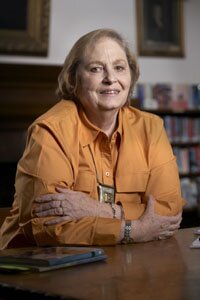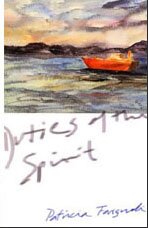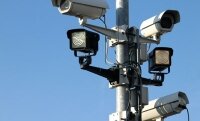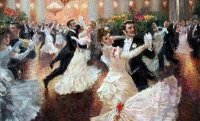Greta Aart speaks w/ Patricia Fargnoli
Poet Laureate of New Hampshire, Patricia Fargnoli (b. 1937) has come a long way. She is a prolific poet and an experienced pedagogy teacher who has been working with emerging poets from all walks of life over the past twenty years. Also a retired clinical psychotherapist, she is a strong advocate of poetry in community, conducting numerous reading events, and designing and facilitating workshops in colleges, bookstores and libraries—both in New England and beyond—for various civic groups and audiences of all ages. Her first two poetry titles, Necessary Light (Utah State University Press, 1999) and Duties of the Spirit (Tupelo Press, 2005) garnered the May Swenson Poetry Award and the Jane Kenyon Book Award respectively. Chapbooks include Lives of Others (Oyster River Press, 2001) and Small Songs of Pain (Pecan Grove Press, 2004). She is also a recipient of a MacDowell Fellowship and Robert Frost Literary Award. Forthcoming and recent poetry appear in Crab Creek Review, Connecticut Review, Valparaiso Review, Mid-American Review and Cimarron Review. Her third and newest poetry title, Then, Something (Tupelo Press, 2009) will appear next fall. Patricia Fargnoli currently resides in the quiet town of Walpole, New Hampshire. She continues to teach poetry writing and appreciation at Keene State College. Her site is www.patriciafargnoli.com.
I was even older than sixty! Sixty-two, and yes, you are right, I had been writing and studying poetry seriously for thirty years then…and had been writing it without really having any idea of craft techniques, without even having read contemporary poetry much for another fifteen years before that. My parents died when I was young, but I was lucky enough to have been raised by an aunt, a retired kindergarten teacher, who read poetry (as well as all the literature classics) to me as a child. So I was brought up to love poetry.
In high school, I published poems (bad ones) in the school paper. And, in early adulthood, I took a few night school poetry classes. But the real work of learning to write well came in my mid-thirties when I enrolled in a graduate class at Central Connecticut State College with the master poet, Brendan Galvin. There were eight women I became close to through that class and we took it together for several years, then continued to meet and critique each other’s poems afterwards. The group still meets though, since I moved 100 miles away, I don’t meet with them as often as I’d like.
Also by Fargnoli, The Cat Metamorphosed into A Woman
I did begin to publish poems in the literary journals long before the book was published and I also gave readings fairly frequently, so I wouldn’t say that I had no public platform at all. My first poem in a literary journal appeared in Poet Lore in the 70′s. And before Necessary Light came out, I’d published over a hundred poems in different journals.
Solitude, pain, vulnerability to death, ambivalence towards defining life, quiet meditations on the often overlooked working-class life…these are some of the themes often explored in your writings. They are real, experienced and honest, neither imaginary nor superficial. What compels you to approach such content matter?
I have always written primarily about the subjects and themes that I am most obsessed by in my real life. Although, of course, one cannot assume that a poem is “fact”, much of my work is based on my own experiences and concerns.
At seventy, loss is inevitable, sometimes losses piled on losses. And so is pain. I am always aware that I may have little time left and always aware of how vulnerable a single woman living on the edge of poverty is in our society.
Also by Fargnoli, On Reaching Sixty-Five
I think that one thing poems can, maybe “should” do is to get down the poet’s experience of the world. I’ve learned that we humans are not terribly different from each other…and that when I can express clearly my own perceptions, thoughts, emotions, etc., other people see themselves in the poems.
Thus, in many of my poems, I feel that I am giving a voice to those who have no voice of their own. And this is especially true about the poems of mine about aging, being single and with limited resources.
Silence also plays a significant role in your poetry. How do you work on silence on the page?
What a good question! I’m wondering which poems in particular you are thinking of. I do think, in general, that my poems are quiet and contemplative. When I write, I am very aware of using images, sound and space to create quiet. Perhaps particularly sound….lots of “s’s,” “l’s,” etc., the soft consonants, lots of “o’s.”
More and more lately, I’ve experimented with more openness in the form on the page….sometimes double-spacing lines… or writing in lines with gaps in them rather than punctuation. And with short stanzas so that there are more spaces between. Also, I’ve found that my lines are getting longer and longer.
I’ve thought a lot about whether I should try to be “louder” in my poems…more energetic, flashier, more postmodern etc. But the fact is that I am a relatively quiet, contemplative person and I don’t know that I could be different or even should be different in my work.
What kind of poetry aesthetics speaks most to you?
I consider my own work to be post-romantic, or even perhaps post-transcendentalist (if there were such a thing). Or perhaps eco-poetic. And certainly “traditional” as opposed to post-modern or avant-garde.
I read many kinds of poetry, but what speaks to me most are the poems that give me some piece of the truth about the world, the universe and our place in it… and that do that in language that amazes me in some way. I don’t think that there is any “Truth”…. only that there are billions of pieces of truth that, all together, make up part of “The Truth”…. and, of course, no matter how many “pieces” we cast out into the world, we will never get the whole of it.
But I want to be able to read a poem and say: “Yes, that’s right” —because it puts into language, what I’ve thought but never been able to say into words.
I was trained primarily in the Imagist School, and I still believe in the primary importance and power of the image. But also, I think that the image alone is often not sufficient, that there are some things that are too complex to be captured in the image alone and that the poet sometimes needs to just say them. I think the trick is to say them quickly and then dive back into the image, metaphor or experience.
I’m not drawn to superficial language play for the sake of language alone. Or to poetry that is not about “meaning.” This may get me into trouble, but I call some of that “meta-poetry” or “flashy, superficial, post-post-modern linguistics.” I do understand that it is an attempt to reinvent language and/or to get the fragmentation and randomness of contemporary life “right”… but I don’ t think, in the long run, it will last. I am drawn to poems that make me “see” in a fresh way, while at the same time, they feed my spirit.
On the other hand, though, I’m fascinated by what some call “elliptical poetry” (though I can’t write it myself.)…or, at least, the type of ellipticism where there is a shadowy backstory behind a rather fragmented confusing surface. CD Wright’s Deepstep Come Shining comes to mind….a haunting book. The repetitions and motifs, the way the story runs beneath its surface.
In your opinion, how has the contemporary poetry scene in American changed?
Vastly. When I began writing there were few, if any, MFA programs…and perhaps 5000 poets in the country (this is a guess). There were few journals and it was a bit easier to get poems published.
Over the years since, with the proliferation of MFA programs, thousands and thousands of poets are regularly writing and submitting work to journals. There are more poetry books being published, and yet because of the huge number of people submitting book manuscripts, it is ever harder both to have individual poems and books published. Poetry contests (once few) have become a primary way for publishers of journals and books to continue to publish new work. Much of this is positive…there is a larger community of poets and thus more support for poets. Poetry is appreciated, I think, by more non-poets than before. Many schools at all levels now teach poetry, both writing and reading it to children… and teach it in a way that encourages creativity.
On the other hand, the difficulty in publishing can be frustrating and discouraging since the competition is much greater than it used to be.
And since the buyers of poetry books are mainly other poets, sales for poetry books are very low, except for those very few people at the top. No one makes any money.
Bottom line: writing poetry and reading it is such a joyful occupation that I’m thrilled that more people can experience it…their lives can’t help but be enriched.
How has your writing life evolved between your first and second book (i.e. Duties of the Spirits) publications, and ever since then?
Hmmmm. I went into a block for several months after Necessary Light was published. I felt that the book was a fluke, that I had just been extremely lucky and that I would never be able to do it again. Then, too, I thought, “Well, now what?” I mean I had just culled those poems as the best of about 25 years of work…so what on earth direction could I take now? In the end, I had to let go of that and just write and see where the writing took me. At the same time, I kept reading hundreds of books of poetry as well as books about poetry.
I knew I didn’t want to deal anymore for the most part with poems about childhood or early adulthood and that I wanted to move toward slightly less narrative work. The poems that got written then seemed to tend toward concerns of aging, nature (which is omnipresent in my work) and spiritual searching.
I have a new book, Then Something due out from Tupelo Press in fall ’09. While in the middle of writing the poems that went into it, I wrote Jeffrey Levine, my publisher, saying: “But I don’t know what to write now?” and he answered: “Write what you write.” Though that seems self-evident, it is one of the best pieces of advice I ever received, because it freed me to trust that whatever it was I needed to say would get said if I simply wrote. This time, the perspective of aging is still there… and nature… but also a further movement toward questions of the spirit and the exploration of liminal places: e.g. between the animal and human world, between life and death; between the idea of God or no God etc.
What is most difficult about poetry for you? And for others?
To write the next poem. I would imagine the same for others.
What is your typical day like now?
I get up about 6:30 am, drink three mugs of coffee, read emails and the poems of the day on “Poetry Daily” and “Verse Daily”… Those two sites are on my computer tool bar and I seldom miss a day. I also read the poem featured on “The Writer’s Almanac” which is delivered to my email box.
Then, if it is not a teaching day, I read poetry or try to write it…I say try because more often than not, it feels impossible. When it is, I work on revisions or perhaps on sending things out. And I spent a big chunk of the morning working on critiques and tutorials for others, and planning classes. So the morning is usually consumed by “work”.
Breakfast around 10 and walking to the post office for mail. An afternoon nap on most days. More e-mail, and reading in the evenings. Bed around 11.
I live a dormouse sort of life. You know, the dormouse in Alice in Wonderland who falls asleep at the tea party but occasionally wakes up, pops up his head and says something brilliant or nonsensical? Because the rather boring life I just described above is broken up by sudden flashes of intense activity: I am currently teaching two classes; one private and one in the Lifelong Learning Program at Keene State College. I give frequent readings and less frequent workshops.
What are your current projects?
The final manuscript of Then, Something is at the publishers…next spring, I’ll be working on proofreading that and other publishing details. Currently, I’m consumed with the class teaching and planning and the tutorials. And I’m trying (a bit desperately) to fit in time and energy to write new poems.
What are your new (or old!) hopes, for life and for your writing craft?
My hopes for life are that I’ll get to continue to live it for a long time and that I can stay reasonably healthy…or at least not get any more unhealthy than I am. My hopes for my writing life are that I’ll continue to publish, that the poems will come, that maybe someday I can have a “New and Selected” book of poems.
–
–
Greta Aart is a former editor for Emprise Review.









